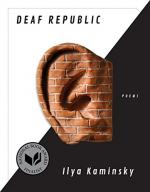|
This section contains 1,015 words (approx. 3 pages at 400 words per page) |

|
And when they bombed other people's houses, we / protested / but not enough, we opposed them but not / enough.
-- Speaker (We Lived Happily during the War)
(We Lived Happily During the War)
Importance: In the collection's opening poem, the speaker describes his response to a faraway war. Lying in his bed in America, the speaker is aware of the political conflict, yet emotionally unaffected by it. In the above lines, the author enacts American citizens' detached response to overseas conflicts. The line breaks creating a halting sensation, illustrating the speaker's reluctance to admit the insufficiency of his efforts. References to resistance in these lines establish a background for the poems enclosed in Acts One and Two.
In the name of Petya, we refuse.
-- Speaker (Deafness, an Insurgency, Begins)
(Act One)
Importance: The morning after the soldiers shoot Petya in the square, the Vasenka citizens wake up and refuse to hear the soldiers' words. They don deafness and dumbness as a form of resistance. Their silence is a way of memorializing Petya, a deaf...
|
This section contains 1,015 words (approx. 3 pages at 400 words per page) |

|



